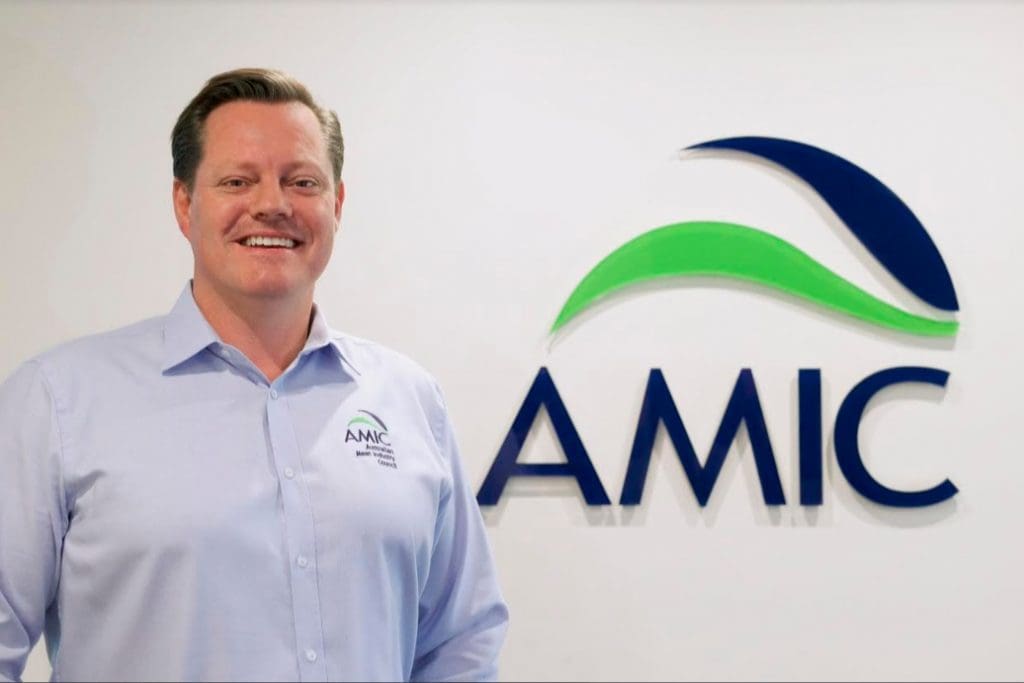
AMIC CEO Patrick Hutchinson — red meat processors are on track with vaccinations and adapting to community transmission pressures.
AUSTRALIA’s peak red meat processor body is confident its Victorian members will meet the October 15 deadline for authorised workers to have their first COVID-19 vaccination.
However, community transmission of COVID-19 is impacting worker levels at some red meat processors, jeopardising the sector’s ability to handle the Spring turn-off of lamb and cattle.
The Victorian Government this week said all authorised workers who have permission to work onsite in the state during lockdown must have their first vaccination by October 15 and get their second dose by November 26, or have an exemption from an authorised practitioner.
Australian Meat Industry Council chief executive officer Patrick Hutchinson conservatively estimated 85pc of AMIC’s member’s workers have had their first COVID-19 vaccination, with 73pc fully vaccinated.
Mr Hutchinson expected the number of fully vaccinated workers to go over 80pc by the middle of next week.
The AMIC CEO expected that the vaccination mandate would have minimal impact on the productivity of processing plants “especially with ridiculous and untested work force caps in metro Melbourne.”
Mr Hutchinson said the industry has invested its own monies in vaccination incentives, COVIDSafe plans and other programs.
“DHHS only recently discussed priority at vaccination hubs a fortnight ago, too late for us.
“Our industry also invested in onsite vaccination hubs which DHHS would not support. This is why we’re well ahead of community vaccination numbers,” he said.
Mr Hutchinson said the workforce cap placed on Victoria’s metropolitan processors never worked.
“We’ve seen nothing to show they work and they literally either send fully vaccinated people home/lose their jobs or send unvaccinated people home or lose their jobs and they’re lost to the vaccination process, which seems counterproductive to the current DHHS and Andrews government program.
“It’s time to thank and promote, the good work our industry does for the vaccination and protection for the community,” he said.
“DHHS is now doing this publicly for the first time, not the CHO or Premier however.”
Community transmission of COVID-19 is impacting processors
Sheep Central has heard unconfirmed reports that several regional Victorian processors have been impacted by community-acquired COVID-19 cases, but Mr Hutchinson said it was not up to him to confirm or deny this.
Mr Hutchinson said except for the Australian Lamb Company’s temporary closure earlier this week, processors affected by community transmission of COVID-19 among workers have been able to re-open within 24-48 hours “which is what should be happening with COVIDSafe plans and vaccination numbers.”
“ALC is being mismanaged (by DHHS) which is stopping their opening, nothing more.
“Therefore yes, it impacts capacity if mismanaged or there is no recognition for the plans in place,” he said.
“This seems to be what is impacting ALC.”
Mr Hutchinson agreed that any COVID-19 imp[acts on regional plants made it more important, in terms of coping with the Spring lamb flush, that the metropolitan plant workforce restrictions end.
“Absolutely.
“MLA’s independent advice backs this up https://www.mla.com.au/prices-markets/market-news/2021/impacts-of-victorian-abattoir-restrictions/”
‘Unworkable rules’ are putting pressure on food supply chains – Walsh
After other media reports that at least six Victorian meat processors were facing disruptions and temporary shutdowns due to the State Government’s broad-brush approach to mandatory isolation, Shadow Minister for Agriculture Peter Walsh said the government had failed to offer a way forward for the food supply chain.
“Unworkable rules are putting huge pressure on the people who keep food flowing through the supply chain and onto Victorians’ tables.
“But instead of working with industry to make sure the right COVID-safe settings are in place to reopen, rebuild and recover, the Andrews Labor Government has slammed the door shut on any consultation,” Mr Walsh said.
Mr Walsh called for a plan to protect the food supply chain, including rapid testing for workers and drivers at processors and distribution centres.
“We could avoid the devastating worker shortages we’re seeing in our supermarkets and across the food supply chain with the use of rapid testing and more targeted contact tracing.
“If workers had access to rapid testing – especially those who were asymptomatic at work – COVID would have been detected before it put the entire food supply chain at risk,” he said.
“We should be using every tool at our fingertips, including following the lead of other states that are using CCTV footage to identify specific close contacts to avoid an entire workforce going into 14 days’ isolation.
“Despite worsening workforce shortages right across Victorian agriculture, Labor’s Agriculture Minister is out-of-ideas, missing-in-action and actively avoiding consulting with the industry.”



HAVE YOUR SAY